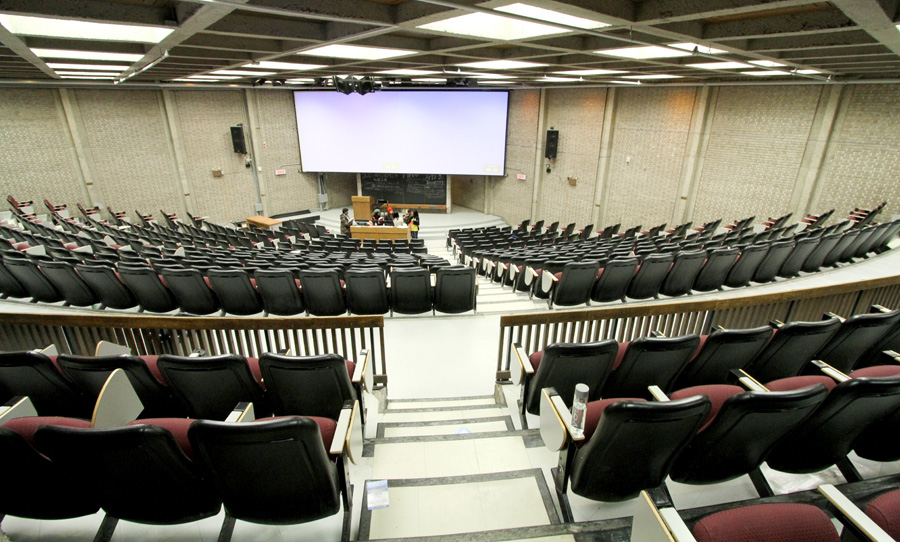McGill’s faculty of arts plans to offer up to 100 fewer courses for the 2013-2014 academic year by reducing the number of faculty and course lecturer positions, according to an announcement at last Wednesday’s faculty meeting.
The faculty offered 1,200 courses this year. Funds made available by the 8 per cent reduction in courses are slated to go towards internships, advising, and increased numbers of positions for teaching assistants (TAs).
According to Dean of Arts Christopher Manfredi, the decision has been under consideration since September 2012.
“Students have consistently indicated that they want more access to our full-time, permanent faculty,” Manfredi said. “This process will bring more students in contact with full-time permanent professors without significantly increasing average class sizes in the faculty.”
Manfredi said courses will not necessarily be “cut,” but that fewer will be offered each academic year. Each department will individually decide how to reduce the number of courses they offer—for example, courses with lower enrollment may be rotated on a two or three year basis.
“In the very unlikely event that a student finds him or herself unable to meet program requirements for this reason, accommodations will of course be found,” he said.
Manfredi reiterated that these changes will not increase class size.
“We’re focusing on [reducing the number of] very small classes so we can reallocate those resources … to make the courses that are already large slightly smaller,” he said. “Then we will provide more teaching assistantships so we can reduce the ratio of students per teaching assistant.”
AGSEM—the union that represents McGill TAs, invigilators, course lecturers, and instructors—was not given any prior notice of the decision, according to AGSEM President Lilian Radovac. Radovac expressed concern at the suggestion that lecturer positions can be filled by TAs.
“They’re really demoting the idea of what course lecturers are, and devaluing what we do,” she said. “A [TA] may only have a BA, as opposed to someone with a Ph.D in their field. Is that the same quality of education?”
 In addition, some students have suggested that the move will be detrimental to their educational experience at McGill. Arts Senator James Gutman criticized the university for reducing the amount of human interaction in the classroom. He pointed towards universities in other provinces that have made more courses available online as a possible long-term result of this attitude toward teaching at McGill.
In addition, some students have suggested that the move will be detrimental to their educational experience at McGill. Arts Senator James Gutman criticized the university for reducing the amount of human interaction in the classroom. He pointed towards universities in other provinces that have made more courses available online as a possible long-term result of this attitude toward teaching at McGill.
“If you look at what’s being cut, it’s [the] smaller courses, and so there’s already a move in that direction,” he said. “I don’t think there’s a big leap between being in a class of 300 and just doing your research online.”
However, there could be more immediate consequences of the decision. While Manfredi said the decision will reduce total enrolment in arts courses by no more than three per cent, students already face long waitlists during course registration. For example, 286 waitlist positions were occupied in the department of political science alone on Monday—the day before Add/Drop period ended this semester.
Arts Undergraduate Society (AUS) Vice-President Academic Tom Zheng said he was “saddened and concerned” by the announcement.
“Fundamentally, I believe that the variety of courses offered in Arts needs to be protected,” he said. “While putting the money saved from the cuts into funding for full-time faculty members and TAs is a sound action, it should not come under the expense of sacrificing course diversity in [the faculty of] arts.”
Tonight, the AUS will hold a Town Hall, where Manfredi will discuss the decision and answer questions from students.
Manfredi emphasized that the faculty’s decision is purely structural. He told the Tribune that the restructuring has nothing to do with the provincial government’s $19 million cuts to McGill’s operating budget. According to Manfredi, the provincial government announced the budget cuts months after the faculty began discussing this step.
“Budget cuts, if any, would have real consequences [on the faculty], but the faculty would face those consequences whether or not it was engaged in the current process of streamlining its teaching offerings,” he said.
Gutman noted that the university was unclear about the motivations behind the reductions. He said Manfredi addressed the arts reductions and the recent budget cuts in the same speech, but didn’t connect them directly.
“The worst case scenario is that they’re going after [course and faculty lecturers] for ideological reasons,” he said. “I asked during the meeting if this was punishment for unionizing [in August 2012]. Manfredi said ‘no.’ ”
Radovic, however, said she was skeptical about the administration’s claim that the budget cuts are unrelated to these reductions. Quebec universities, including McGill, claim to have had no prior knowledge of the budget cuts before they were announced on Dec. 6, 2012.
“It seems very unlikely to me that the university would have had no knowledge of any kind of forthcoming education cuts prior to when they were announced in December,” she said.
Radovac also questioned the sudden reallocation of funds towards TAs, when the university has consistently decreased TA hours for years. She added that the reallocation of funds to internships and advising would ultimately “take money out of the classroom.”
“If the university, as it claims, has no choice but to implement these radical cuts, at least be honest about it—say students are going to get less teaching support,” she said. “Don’t try to make it look like you’re going to make up the difference in another area.”
Radovac said AGSEM is currently working to raise awareness about the decision and will work with students to have the cuts revoked.








Pingback: Dean of Arts addresses student concerns over course cuts - McGill Tribune